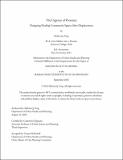The Urgency of Presence: Designing Healing Community Spaces After Displacement
Author(s)
Teng, Melissa Q.
DownloadThesis PDF (120.0Mb)
Advisor
D’Ignazio, Catherine
Terms of use
Metadata
Show full item recordAbstract
Named for its proximity to the intersection of Massachusetts Avenue and Melnea Cass Boulevard, “Mass. and Cass” is an informal neighborhood in Boston that is often described in the news with disaster-tinged language like “epicenter” and “tent city”. After this neighborhood was declared a “public health crisis”, the City of Boston made major investments into constructing and bolstering permanent supportive housing and other much-needed services. But when we sat with its unhoused, drug-using, and outreach communities on the ground, they described parallel investments in militarized public spaces, an exclusionary neighborhood planning process, and stigmatizing media stories that overemphasize the neighborhood’s crime and violence. Most narratives about “Mass. and Cass” ignore these structural oppressions, exemplifying how current “solutions” to homelessness are less concerned with the well-being of unhoused people and more with their disappearance from public space. In response, our art collective See You In The Future has been working with community members of “Mass. and Cass” and poor people’s movements to research how histories of crisis and displacement connect with current anti-homeless policies, and to collectively imagine what healing community spaces might feel like. Centering the wisdom and lived experiences of residents and staff—and informed by liberatory and loving philosophies like harm reduction, disability justice, and abolition—we offer four spatial design values: belonging, care, hope, and growth. As our project is ongoing, this document shares our work thus far: our methods rooted in seeing and solidarity; research on the creative labor of maintaining community spaces despite policy interventions; practical notes on designing workshops and a mural; and finally reflections on presence and solidarity as outside artists and designers. Because we are focusing on community stories, which are in some sense infinite, I present our work as a series of essays to emphasize the indeterminate, character-led, and emotional nature of our methods and findings. My hope is this reads like a walk, where our feet stay planted on the ground and the humanity of community members never leaves our sight.
Date issued
2023-09Department
Massachusetts Institute of Technology. Department of Urban Studies and PlanningPublisher
Massachusetts Institute of Technology